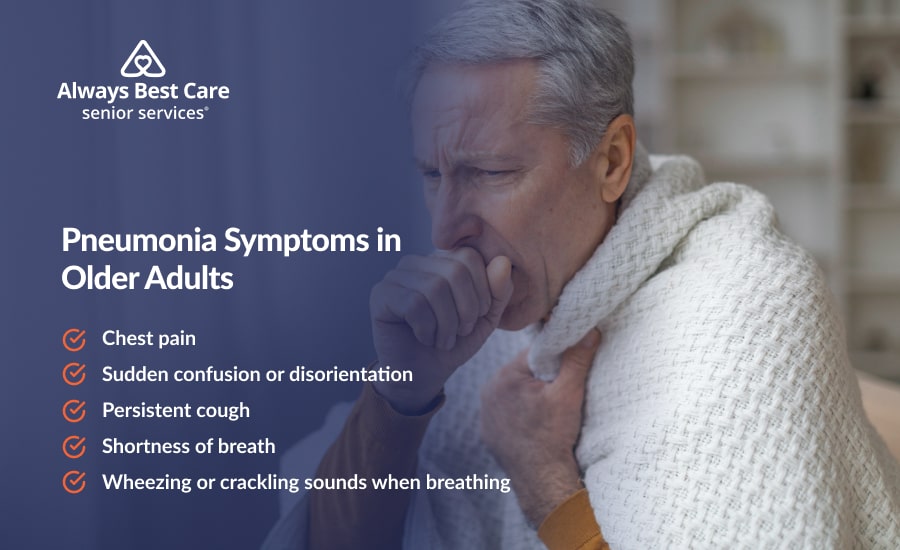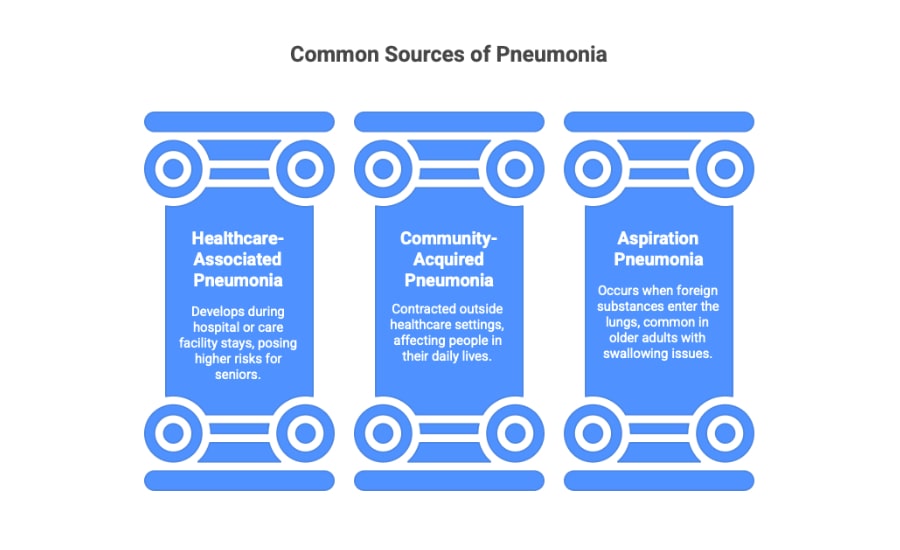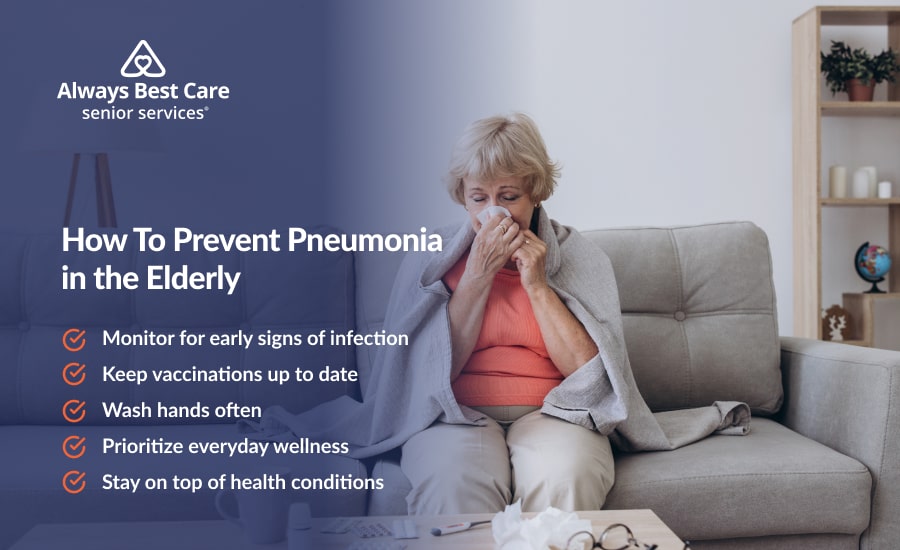Pneumonia in the Elderly: Symptoms, Prevention & FAQs

Table of Contents
Pneumonia in the Elderly Explained: Key Takeaways
- The causes of pneumonia are generally classified by where it was acquired and the type of virus, bacteria, or fungus responsible
- Pneumonia in the elderly can progress quickly and might present with subtle or atypical symptoms like confusion, low-grade fever, or sudden mobility decline
- Reducing the risk of pneumonia in the elderly includes staying up to date on vaccines, managing chronic illnesses, avoiding lung irritants, and addressing swallowing or oral health issues
If your elderly loved one is experiencing trouble breathing, fever with chills, chest pain that worsens when they breathe deeply or cough, and unexplained weight loss, they might be dealing with pneumonia.
The American Lung Association notes that even healthy adults aged 65 and older are more than 10 times as likely to be hospitalized with pneumococcal pneumonia as those aged 18 to 49.
In this guide, we will:
- Share how to recognize the common symptoms and warning signs of pneumonia in older adults
- Cover the top causes of pneumonia in seniors to help reduce their risk and keep them safe
- Explore proven strategies to help prevent pneumonia in the elderly
Common Symptoms and Warning Signs of Pneumonia in the Elderly
Pneumonia is a lung infection that can be life-threatening for older adults, especially those with compromised immune systems or chronic illnesses.
While not all older adults will have these symptoms, they’re still important to watch for:
- Sudden confusion, disorientation, or unusual sleepiness
- Persistent cough (might produce yellow, green, or bloody mucus)
- Shortness of breath or rapid, shallow breathing
- Chest pain that worsens with deep breathing or coughing
- Audible wheezing or crackling sounds in the lungs
- Loss of appetite or refusal to eat
- Unexplained fatigue or weakness
- Decline in mobility or sudden inability to perform daily tasks
- Fever might be mild or absent, even during a severe infection
- A drop in body temperature, also known as hypothermia, in some cases
- Bluish or gray lips and fingertips (signs of low oxygen levels)
- Rapid heart rate or palpitations
- Nausea, vomiting, or diarrhea
- Abdominal pain without another clear cause
Top Causes of Pneumonia in the Elderly
The causes of pneumonia are generally classified in two ways:
- Where it was acquired
- What type of virus, bacteria, or fungus is responsible
Here’s an overview of where pneumonia can be acquired and how it might relate to older adults:
3 Common Ways People Get Pneumonia
- Healthcare-associated pneumonia: This develops during a stay in a hospital or long-term care facility. Seniors in these settings face a higher risk.
- Community-acquired pneumonia: This is pneumonia caught outside a hospital or care facility.
- Aspiration pneumonia: Occurs when food, saliva, or vomit enters the lungs, a problem often seen in older adults with swallowing difficulties.

Germs That Can Cause Pneumonia
Pneumonia can be caused by bacteria, viruses, or, less often, fungi, with bacterial infections being the most common in adults. The specific germs in older adults can vary.
In cases of community-acquired pneumonia (CAP), older adults were most often infected by:
- Streptococcus pneumoniae: A common bacterial cause of lung infections
- Haemophilus influenzae: Another type of bacteria linked to respiratory illness
- Respiratory viruses: Including those that cause colds, influenza, and COVID-19
How To Prevent Pneumonia in the Elderly
Older adults are more vulnerable to pneumonia, but there are still ways to help keep your loved one healthy.
Pneumonia prevention comes down to everyday habits that boost their immune system, limit exposure to germs, and address any health challenges they might have:
- Stay on top of vaccinations: Pneumococcal vaccines protect against common bacterial causes of pneumonia, while flu shots help prevent influenza-related cases. The Center for Disease Control and Prevention’s Advisory Committee for Immunization Practices (ACIP) found that the Capvaxive (PSV21) offers protection against 21 strains of Streptococcus pneumoniae. If you’re unsure which vaccines are best, talk with your elderly loved one’s doctor about boosters and other recommended immunizations.
- Make handwashing a habit: Washing hands regularly with soap and warm water for at least 20 seconds or using an alcohol-based sanitizer is one of the most effective ways to prevent the spread of germs.
- Focus on overall wellness: A balanced diet, enough rest, staying hydrated, and gentle daily activity all help keep the body strong against infection.
- Manage ongoing health conditions: Keeping illnesses like chronic obstructive pulmonary disease (COPD), diabetes, and heart disease under control lowers the risk of pneumonia, as these conditions can weaken the immune system, impair lung function, and make it more difficult for the body to fight off infections. Ensure your elderly loved one stays on track with medications and regular medical checkups.
- Lower aspiration risks: If swallowing is difficult, choose softer foods, encourage slow eating, and keep them upright during and after meals to help keep food and liquids out of the lungs.
- Encourage smoking cessation: Smoking damages lung tissue and weakens defenses against infection. Helping your loved one quit or avoid secondhand smoke can significantly minimize their risk of pneumonia. In fact, a 2024 population-based study found that current smokers had a 42% higher risk of developing pneumonia compared to non-smokers.
- Maintain a smoke- and pollutant-free home: Together with avoiding cigarette smoke, reduce exposure to dust, mold, and harsh cleaning fumes, which can irritate the lungs and make infections more likely.
- Support good oral hygiene: Poor dental health can let harmful bacteria enter the lungs, especially in those who aspirate. Brushing twice a day, cleaning dentures, and seeing the dentist regularly are important ways to help prevent this.
- Monitor for early signs of infection: Pay attention to coughs, fevers, or changes in breathing, such as crackling sounds. Catching symptoms early allows for faster treatment before the illness worsens.
- Promote breathing exercises: Gentle deep-breathing activities or using an incentive spirometer (if recommended by a doctor) can help keep your elderly loved one’s lungs clear and strong, especially if they have limited mobility.
- Limit your elderly loved one’s exposure during cold and flu season: Avoid crowded places when possible and ask anyone who’s sick to wait until they’re well before visiting.
- Keep your elderly loved one’s home environment clean and healthy: Disinfect high-touch surfaces like doorknobs, light switches, remotes, and phones, and replace HVAC or air purifier filters every one to three months to keep air clean and reduce germs.

How To Protect Older Adults from Pneumonia When They’re Already Sick
If your elderly loved one is already sick, their risk of pneumonia increases.
Recent reports show that about 1 in 300 flu cases progress to pneumonia, with rates even higher in older adults, especially those with existing chest or respiratory conditions.
Here’s what you can do to help your elderly loved one:
- Follow the treatment plan exactly as prescribed: Taking medications, whether antivirals, antibiotics, or inhalers, on schedule ensures the illness is treated effectively before it can worsen.
- Encourage plenty of rest and avoid overexertion: Rest allows the immune system to focus on recovery rather than competing with physical stress.
- Stay well-hydrated: Drinking water and warm fluids helps thin mucus, making it easier to clear the lungs and less likely to become a breeding ground for bacteria.
- Perform lung-expanding exercises: Deep breathing or gentle coughing techniques help keep the airways open and prevent fluid buildup in the lungs.
- Maintain nutrient-rich meals, even in small portions: Foods rich in protein, vitamins C and D, and zinc support immune defense and tissue repair.
- Minimize exposure to new germs: Getting another infection while you’re already sick can raise the risk of complications like pneumonia. To help protect your elderly loved one’s health, limit visitors and consider wearing a mask around others.
- Watch for early warning signs of pneumonia: Symptoms like worsening cough, fever, shortness of breath, chest pain, or sudden confusion require immediate medical attention to prevent rapid progression.
Pneumonia in the Elderly: When To Seek Medical Care
Pneumonia can take a serious turn quickly in older adults, making early diagnosis crucial.
If your elderly loved one shows any of the following signs, seek medical care right away:
- Difficulty breathing or shortness of breath
- Chest pain or pressure
- Bluish tint to the lips, face, or fingernails
- Unusual body temperature, either a high fever or lower-than-normal temperature
Manage Pneumonia in the Elderly With Always Best Care
Recovering from pneumonia can be especially challenging for older adults, but with Always Best Care’s skilled home health services, your loved one can heal in the comfort and safety of home.
Our licensed nurses work closely with families to create a personalized care plan that supports recovery and helps prevent relapse.
We help with:
- Medication reminders to ensure prescriptions are taken correctly and on time
- Respiratory therapy and breathing exercises to strengthen lung function
- Ongoing health monitoring to detect changes early and address them promptly
- Nutritional guidance to support immune health and promote healing
- Education for families on warning signs, preventive care, and ongoing support
Pneumonia in the Elderly: FAQs
What are the final stages of pneumonia in the elderly?
In its final stages, pneumonia can cause respiratory failure, sepsis, or multi-organ failure.
In the elderly, this may appear as severe breathing trouble, dangerously low oxygen, confusion, bluish lips or fingertips, and rapid health decline.
Hospitalization is often necessary, and care might shift to comfort if recovery is unlikely.
How long is the recovery time for pneumonia?
Recovery time varies depending on age, overall health, and the severity of the infection.
- Mild pneumonia: Some older adults may start to feel better within two to four weeks, though fatigue and cough can linger for a month or more.
- Moderate to severe pneumonia: Recovery can take several weeks to a few months, especially if complications arise or the individual has chronic health conditions. Full recovery in the elderly often requires extra time and supportive care to rebuild strength and lung capacity.
What not to eat during pneumonia?
While there’s no strict “pneumonia diet,” certain foods can hinder recovery by causing inflammation, bloating, or dehydration:
- Processed or fried foods high in unhealthy fats and additives
- Sugary snacks and drinks that can suppress immune function
- Excessively salty foods that might contribute to dehydration
- Gas-producing foods (like carbonated drinks or cabbage) if they cause discomfort while breathing Instead, focus on nutrient-rich, easy-to-digest meals with plenty of fluids.
What helps pneumonia heal faster?
- Follow the treatment plan exactly as prescribed, including all antibiotics or antivirals
- Get plenty of rest to allow the body to focus on healing
- Stay well-hydrated with water, herbal teas, and broths
- Avoid smoke and lung irritants to decrease inflammation
- Seek prompt medical help if symptoms worsen or new ones develop





